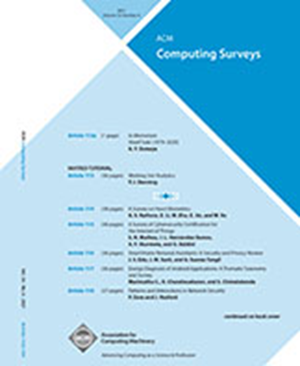用人工智能推进5G安全和隐私:一项调查
IF 23.8
1区 计算机科学
Q1 COMPUTER SCIENCE, THEORY & METHODS
引用次数: 0
摘要
随着第五代移动通信技术(5G)的全球部署,一个以超高数据速度、超低延迟、海量连接为特征的新时代已经出现。然而,这些进步也带来了新的安全和隐私挑战。新技术与5G的融合从根本上改变了网络结构,传统的安全方法已经不够用。人工智能(AI)具有先进的数据分析和模式识别能力,是增强5G网络安全性和隐私性的有前途的解决方案。虽然现有的调查讨论了5G的人工智能应用,但缺乏对各种基于人工智能的5G安全和隐私解决方案性能的全面调查。本文旨在通过深入回顾人工智能在5G安全和隐私方面的最新进展来填补这一空白。我们首先概述5G网络中的安全和隐私挑战,包括潜在漏洞、攻击媒介和隐私问题。然后,我们提出了一套评估标准,用于评估各种基于人工智能的解决方案。在此之后,我们提出了基于人工智能的安全和隐私解决方案的分类,并回顾了最新进展。最后,我们确定了开放的问题,并提出了利用人工智能增强5G安全和隐私的未来方向。本文章由计算机程序翻译,如有差异,请以英文原文为准。
Advancing 5G Security and Privacy with AI: A Survey
With the global deployment of the fifth-generation (5G) mobile technology, a new era characterized by ultra-high data speeds, ultra-low latency, and massive connectivity has emerged. However, these advancements also introduce new security and privacy challenges. The integration of new technologies in 5G has fundamentally altered the network structure, rendering traditional security methods inadequate. Artificial intelligence (AI), with its advanced data analysis and pattern recognition capabilities, is a promising solution to enhance security and privacy in 5G networks. While existing surveys discuss AI applications for 5G, there is a lack of a comprehensive survey on the performance of various AI-based solutions for 5G security and privacy. This paper aims to fill this gap by providing an in-depth review of the latest advancements in AI for 5G security and privacy. We begin with an overview of the security and privacy challenges in 5G networks, including potential vulnerabilities, attack vectors, and privacy issues. We then propose a set of evaluation criteria for assessing various AI-based solutions. Following this, we present a taxonomy of AI-based security and privacy solutions and review the latest advancements. Finally, we identify open issues and propose future directions for utilizing AI to enhance 5G security and privacy.
求助全文
通过发布文献求助,成功后即可免费获取论文全文。
去求助
来源期刊

ACM Computing Surveys
工程技术-计算机:理论方法
CiteScore
33.20
自引率
0.60%
发文量
372
审稿时长
12 months
期刊介绍:
ACM Computing Surveys is an academic journal that focuses on publishing surveys and tutorials on various areas of computing research and practice. The journal aims to provide comprehensive and easily understandable articles that guide readers through the literature and help them understand topics outside their specialties. In terms of impact, CSUR has a high reputation with a 2022 Impact Factor of 16.6. It is ranked 3rd out of 111 journals in the field of Computer Science Theory & Methods.
ACM Computing Surveys is indexed and abstracted in various services, including AI2 Semantic Scholar, Baidu, Clarivate/ISI: JCR, CNKI, DeepDyve, DTU, EBSCO: EDS/HOST, and IET Inspec, among others.
 求助内容:
求助内容: 应助结果提醒方式:
应助结果提醒方式:


